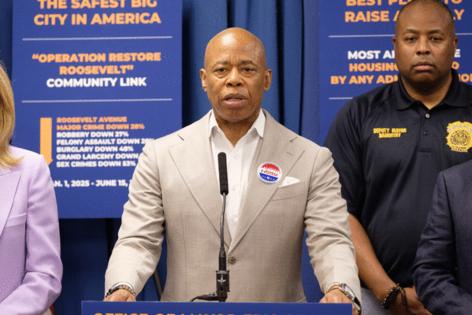NYC Mayor Adams seeks power to force drug addicts into treatment
Published in News & Features
NEW YORK — Mayor Eric Adams called on Albany lawmakers Thursday to grant New York City powers to forcibly hospitalize people struggling with drug addiction — a proposal that was quickly met with intense pushback from civil rights and homeless advocates.
Adams’ plan — unveiled during a Midtown event hosted by the conservative Manhattan Institute — proposes the state Legislature acts to expand the involuntary commitment standards during next year’s legislative session.
The plan would build on a provision Albany included in this year’s state budget that gave the city expanded authority to hospitalize homeless people against their will if they’re dealing with severe mental health issues. Adams, addressing a conservative crowd at the Midtown Hilton, characterized the new proposal as a “lifeline” for those in the throes of drug addiction.
“Doctors should have the ability to seek a court order to mandate treatment for substance abuse even if the person’s addiction makes them unwilling to accept treatment on their own,” Adams said to applause, adding that such an expansion would become “the single most effective tool to help us end the drug abuse crisis we see all around us.”
The plan faces a number of obstacles. Lawmakers in Albany may balk at the expanded powers, while Adams, reeling from record low approval ratings and continued fallout from his corruption indictment, faces a difficult path to reelection in November’s election, with polls showing he’s unlikely to be mayor next year.
The proposal also sparked immediate pushback from the advocacy community.
The Legal Aid Society, which by statute represents New York City’s homeless population, blasted Adams’ latest proposal as raising “serious civil rights concerns” and doing “nothing to address the root causes of substance use.”
“If the mayor were serious about saving lives, he would invest in proven harm reduction strategies, voluntary treatment, permanent housing, and community-based supports — not policies that amount to state-sanctioned incarceration in medical settings,” the group said in a statement. “Expanding involuntary commitment laws will not solve the drug war or end the overdose crisis; it will only deepen mistrust, waste resources, and cause lasting harm to the very people the city claims to want to help.”
According to a fact-sheet released by Adams’ office, the plan, dubbed the “Compassionate Interventions Act,” would fill a gap in state law that prevents clinicians and police officers from forcing a person into treatment primarily due to suspected substance use disorder.
Under the reforms adopted by Albany this year, the city can involuntarily commit anyone who “appears” mentally ill, and the new proposal says a similar standard should exist for severe drug addicts. The plan stresses the call on whether to force a person into treatment for substance abuse would ultimately lie with a medical professional.
The Adams plan says that would bring New York in line with 37 other states that have similar laws. Florida has had a similar law on the books since 1993, and homeless advocates have long argued it infringes on people’s civil liberties.
The State Assembly and State Senate, which are controlled by super majorities of Democrats, were for years skeptical of the mayor’s proposal to expand powers related to involuntary commitments of mentally ill individuals. The proposal to further expand the protocols to include drug addicts could thereby be a tough sell in the capital, especially given Adams’ longshot chances at reelection.
After his speech, Adams was asked in a Q&A with Manhattan Institute President Reihan Salam how he envisions being able to rally support for the proposal, given the anticipated pushback in Albany.
“Our statehouses and even our City Council — they have been hijacked by the numerical minority with far extremist, far left extremist views, and they have gotten in the way, the noise has gotten in the way of real progress around these quality of life issues,” Adams replied.
“And so the first thing that I did when I became mayor, I went out and purchased a bunch of ear plugs and put them in my ears so I could ignore the noise.”
Donna Lieberman, the executive director of the New York Civil Liberties Union, said Adams’ proposal comes from the “same old, failed playbook.”
“Forced treatment can greatly increase the risk of a fatal overdose, raises serious due process and civil liberties concerns, and contributes to harmful stereotypes about people with substance use disorders,” she said.
On the funding question, Adams’ plan proposes to allocate a $27 million new investment in expanding services for those in need of addiction care. It was not clear over how long of a period that funding would be allocated, and the blueprint is light on details on what exactly the new services would involve.
Spokespeople for Gov. Hochul and state legislative leaders didn’t immediately return requests for comment.
Fabien Levy, Adams’ deputy mayor for communications, said he didn’t know whether Adams’ team has had conversations with the governor about the proposal.
In his speech, Adams argued the drug addiction crisis has been a problem in the city for years.
Asked by the Daily News why Adams is first now rolling out the new proposal, Randy Mastro, his first deputy mayor, said, “It’s always right to do the right thing.”
“This administration has worked so hard for the past three and a half years to address these issues, and we’re going to continue to put out policies,” Mastro said.
_____
©2025 New York Daily News. Visit nydailynews.com. Distributed by Tribune Content Agency, LLC.







Comments